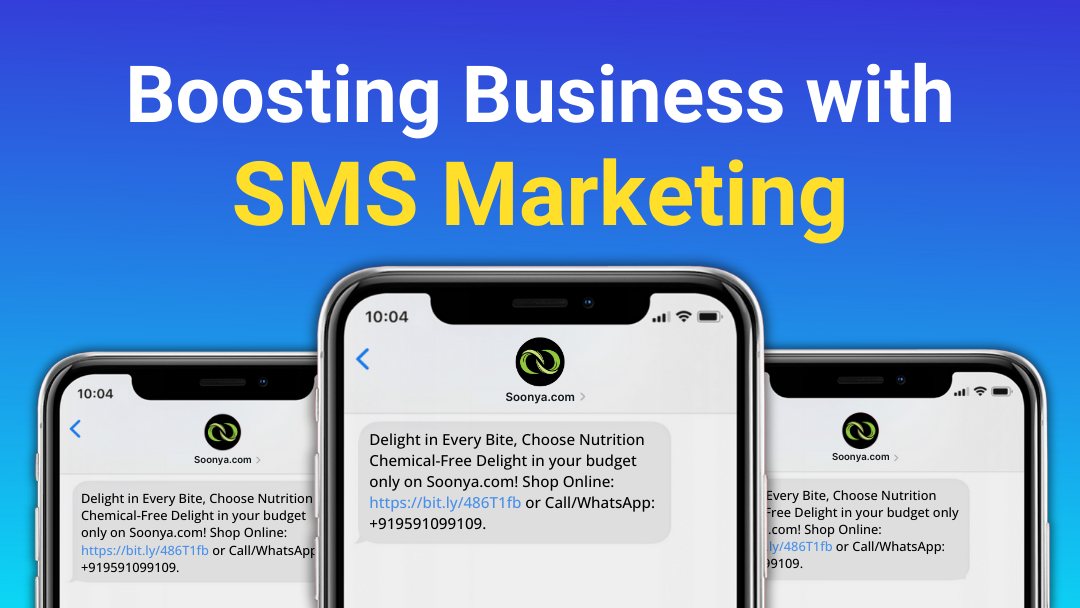Are you confused about how to get started with SMS marketing for your business? Don’t worry this article will guide you step by step.
What is SMS Marketing?
SMS marketing, also known as text message marketing, is a marketing strategy that involves sending promotional messages or offers to a group of people via SMS (Short Message Service) or text messages. It is a direct and efficient way for businesses to communicate with their target audience, providing them with updates, promotions, discounts, reminders, and other valuable information. SMS marketing can be used to drive customer engagement, increase sales, build brand awareness, and enhance customer loyalty.
Is SMS Marketing Legal?
SMS marketing is legal as long as it complies with regulations and laws set by the country in which it is conducted. It is important for businesses to obtain permission from recipients before sending them marketing messages, provide them with an easy opt-out option, and adhere to any other regulations regarding unsolicited communication. Additionally, businesses must also comply with privacy laws and protect the personal information of recipients.
Benefits of SMS Marketing
1. High Open Rate: SMS messages have an average open rate of 98%, compared to 20% for email marketing. This implies that your target audience is more likely to see and read your message.
2. Instant Delivery: SMS messages are delivered instantly, allowing you to reach your customers in real time. This can be especially beneficial for time-sensitive promotions or urgent notifications.
3. High Engagement: SMS messages have a higher engagement rate compared to other marketing channels. People are more likely to respond to a text message than an email or social media post.
4. Targeted Messaging: SMS marketing allows you to segment your audience and send targeted messages to specific groups. This helps you personalize your marketing efforts and deliver relevant content to your customers.
5. Cost-Effective: SMS marketing is a cost-effective marketing channel, especially compared to traditional advertising methods such as TV or radio ads. It is relatively inexpensive to send bulk SMS messages, making it suitable for small businesses with limited marketing budgets.
6. High Conversion Rate: SMS messages have a higher conversion rate compared to other marketing channels. Whether you’re promoting a sale, launching a new product, or sending a discount code, SMS marketing can help drive immediate action from your customers.
7. Increased Customer Loyalty: By using SMS marketing, you can stay in touch with your customers on a regular basis and keep them informed about your latest products, sales, or promotions. This can help build customer loyalty and encourage repeat purchases.
8. Simple & Convenient: SMS marketing is a straightforward and easy-to-use marketing channel. It doesn’t require complicated software or technical skills, making it accessible to businesses of all sizes.
9. Opt-In Process: SMS marketing requires customers to opt-in to receive messages, ensuring that your audience is interested and willing to engage with your brand. This helps you target a more receptive and engaged audience.
10. Trackable Results: SMS marketing platforms provide analytics and tracking capabilities, allowing you to measure the success of your campaigns. You can monitor the delivery rate, open rate, click-through rate, and conversion rate, enabling you to make data-driven decisions and optimize your marketing efforts.
How to Use SMS Marketing?
Using SMS marketing involves several key steps:
1. Build a Subscribers List: Start by building a list of subscribers who have given their consent to receive SMS marketing messages from you. This can be done through opt-in requests on websites, social media, or in-store sign-ups.
2. Choose a Platform: Select an SMS marketing platform or service provider that fits your needs. Look for features like the ability to send bulk SMS, segment your audience, schedule messages, and track results.
3. Craft Engaging Messages: Create concise and engaging messages that grab attention. SMS messages have a character limit, so keep the content clear and direct. Include a strong call to action and provide value to your subscribers.
4. Segment Your Audience: Divide your subscribers into different groups based on demographics, interests, or past customer behavior. This allows you to personalize your messages and target specific groups with relevant content, increasing engagement and conversions.
5. Timing & Frequency: Determine the best time to send your messages based on your target audience’s behavior. Avoid sending too many messages to avoid overwhelming your subscribers and causing them to unsubscribe.
6. Incorporate Multimedia: Enhance your SMS messages with multimedia content like images, videos, or gifs to make them more engaging and visually appealing.
7. Analyze & Optimize: Use the analytics provided by your SMS marketing platform to track the success of your campaigns. Monitor open rates, click-through rates, and conversion rates to understand what works and optimize future messages for better results.
8. Offer Incentives: Offer exclusive discounts, promotions, or rewards to encourage users to engage with your SMS messages. This can help drive conversions and create a sense of loyalty among subscribers.
9. Comply with Regulations: Ensure that you comply with all regulations, such as obtaining proper consent from subscribers and providing an opt-out option in every message. It’s important to adhere to applicable laws, such as the CAN-SPAM Act in the United States or the General Data Protection Regulation (GDPR) in the European Union.
10. Test & Iterate: Continuously test different strategies, such as message content, timing, and segmentation, to identify what resonates best with your audience. Use the insights gained to refine your approach and maximize the effectiveness of your SMS marketing efforts.
SMS Marketing Best Examples
Here are some examples of successful SMS marketing campaigns:
1. Domino’s Pizza: Domino’s implemented an SMS campaign that allowed customers to opt-in and receive exclusive deals and promotions. This campaign resulted in increased customer engagement and sales.
2. Nordstrom: Nordstrom used SMS marketing to inform customers about upcoming sales and exclusive offers. They also provided personalized recommendations based on customers’ past purchases. This campaign improved customer loyalty and drove repeat purchases.
3. Starbucks: Starbucks used SMS marketing to promote their rewards program and send personalized offers to customers. This campaign increased customer participation in their loyalty program and generated more foot traffic to their stores.
4. JetBlue: JetBlue used SMS marketing to send flight updates, boarding information, and exclusive flight deals to their customers. This campaign improved customer experience and increased engagement with the brand.
5. Sephora: Sephora used SMS marketing to send beauty tips, product recommendations, and exclusive promotions to their customers. This campaign resulted in increased website and in-store visits and boosted sales.
These examples demonstrate how SMS marketing can be personalized, targeted, and provide value to the customers, leading to improved engagement, customer loyalty, and increased sales.
SUMMING UP
SMS marketing has become an increasingly popular strategy for businesses to connect with their customers. Sending text messages to customers’ mobile phones allows businesses to directly reach their target audience and deliver personalized messages.
In fact, SMS marketing can be a powerful tool for businesses to connect with their customers, increase engagement, and drive conversions. By leveraging the high open and response rates of text messages, businesses can deliver targeted and valuable messages directly to their target audience’s mobile phones, maximizing the impact of their marketing efforts.

